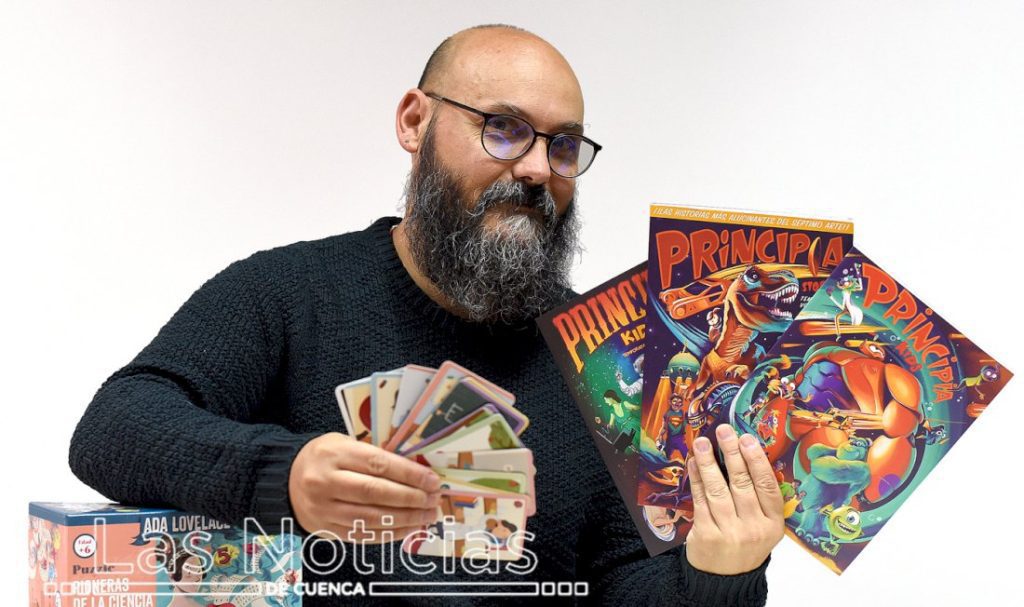Frustrated and tired of the “fragileness” of his research career, Enrique Royuela Casamayor (Cuenca, 1976), who was devoted to the study of the field of molecular virology, decided one fine day to put a spin on his life, despite not detaching himself not only from the world of science, but Also on the publishing side with the creation of Principia in 2014, an educational project with a gender perspective that has since given life to board games and various publications, among other products.
The man from Cuenca has a degree in biology and a PhD in microbiology, genetics and physiology from the University of Alicante, and has carried out his work as a researcher in the field of molecular virology at the National Center of Microbiology and the Network Research Center for Epidemiology. and public health. From this point on, Rowiela highlights the collaboration they had with the World Health Organization (WHO) group on viral classification and nomenclature, for which they developed a molecular diagnostic method for mumps (a viral infection affecting the glands). It is called parotid saliva.
However, he was encouraged one day to change course by creating an informative brand that seeks to make science interesting in a pictorial manner and also based on interactive and audiovisual resources that enrich the experience.
Board games, puzzles and a set of posters in the style of classic football but with scientists called “The Extraordinary League of Science” are some of the materials created by this brand, which uses entertaining formats to spread scientific content among the young ones.
And within this project, the man from Cuenca takes another step in 2022 by creating the Principia Tebeos label, of which Royuela is the creator, managing editor and screenwriter. In turn, within this company, she gave life to the “Intrépids” series, a collection of mini-comics that tell the story of pioneering women in the sciences, the arts and the humanities.
Within the framework of this series and in collaboration with young illustrators, four titles have already been published: Maryam Mirzakhani, Iranian mathematician and first woman to receive the Fields Medal for her contributions to geometry and dynamical systems; Rita Levi-Montalcini, the Italian neuroscientist who was persecuted by Mussolini’s fascist regime and who came to set up a secret laboratory in her room, was awarded the Nobel Prize in Medicine and Physiology; Wangari Maathai, a Kenyan biologist and ecologist who won the Nobel Peace Prize for her contribution to sustainable development, women’s empowerment, democracy and peace through her Green Belt Movement initiative; and Margarita Salas, a pioneering Asturian chemist and biochemist who popularized molecular biology in Spain.
And in December, the fifth is scheduled for release, which will be dedicated to Caroline Bertuzzi, the current Nobel Laureate in Chemistry and the eighth to receive the honor.
On the other hand, the man from Cuenca is also working on a publication about the world and the Spanish engraver María Teresa Toral, a chemist and pharmacist imprisoned by the Franco and then exiled in Mexico, although in this case she is not part of the ‘Entripidas’. Comics collection because it is a long graphic novel.
“We realized that science goes in better when you tell a story and engage the reader. We use narration in a more interesting illustrated format, which makes for more effective communication,” says the former researcher. Numerous awards, including the Bitácoras Award for Best Artistic and Cultural Blog, support Principia’s work over these years.
“Look at Us”, a podcast dealing with science and disability, is another of the initiatives from Cuenca. “We always have projects in mind,” he concludes.

“Social media evangelist. Student. Reader. Troublemaker. Typical introvert.”

:quality(85)/cloudfront-us-east-1.images.arcpublishing.com/infobae/TEQF6EONZRFGLLLDIDD4L2O4EE.jpg)

:quality(75)/cloudfront-us-east-1.images.arcpublishing.com/elcomercio/XU32LRAEZFDDPNVHLFU3CKVBYY.jpg)



More Stories
Venezuela ranks fourth in female leadership in science and technology in Latin America
In Portuguesa and Sucre they explore the wonderful world of science
The university court overturns the expulsion of two teachers and a chemical sciences student